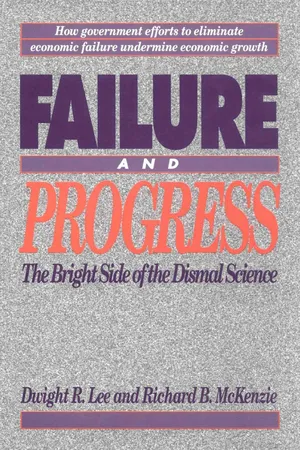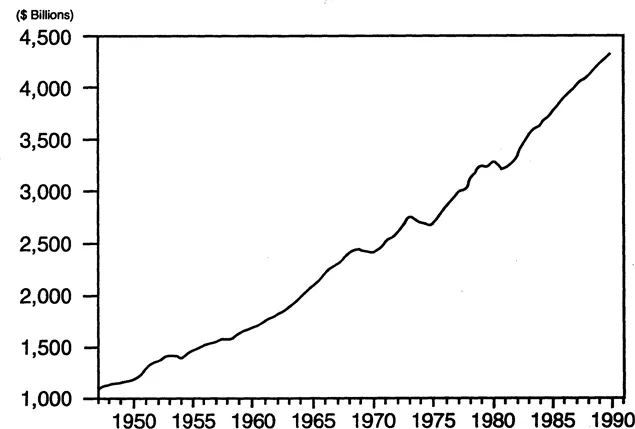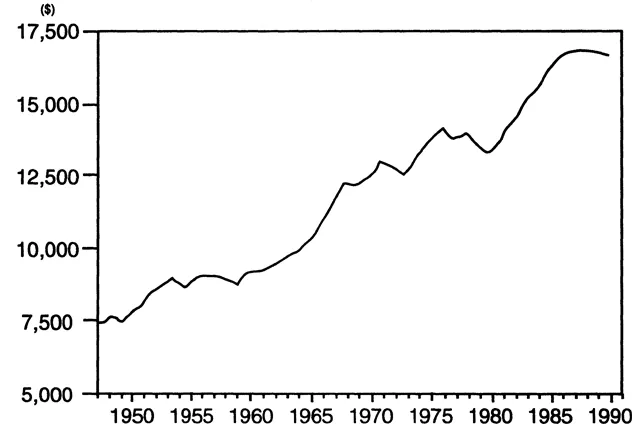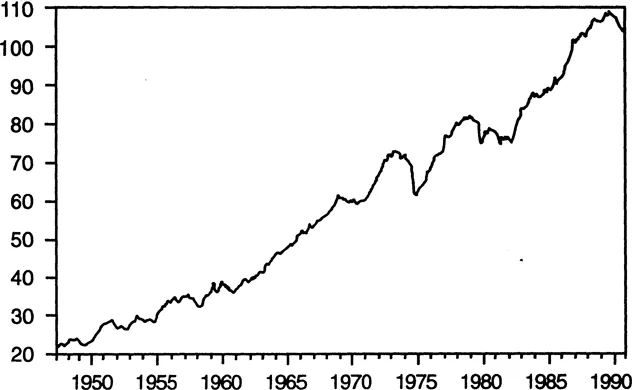
eBook - ePub
Failure & Progress
The Bright Side of Dismal Science
Dwight R. Lee, Richard B. McKenzie
This is a test
- 180 pages
- English
- ePUB (mobile friendly)
- Available on iOS & Android
eBook - ePub
Failure & Progress
The Bright Side of Dismal Science
Dwight R. Lee, Richard B. McKenzie
Book details
Book preview
Table of contents
Citations
About This Book
Is a free-market economy cruel because some people are left unprotected against economic failure? Some believe so and favor a vast government safety net. But the authors of this readable and eye-opening book argue that government cannot mitigate failure without also eliminating opportunities for success. The authors show that the money absorbed by bureaucracy in the name of helping the poor would be better spent in the wealth-creating sector where it would actually make people better off by producing growth and jobs.
Frequently asked questions
How do I cancel my subscription?
Can/how do I download books?
At the moment all of our mobile-responsive ePub books are available to download via the app. Most of our PDFs are also available to download and we're working on making the final remaining ones downloadable now. Learn more here.
What is the difference between the pricing plans?
Both plans give you full access to the library and all of Perlego’s features. The only differences are the price and subscription period: With the annual plan you’ll save around 30% compared to 12 months on the monthly plan.
What is Perlego?
We are an online textbook subscription service, where you can get access to an entire online library for less than the price of a single book per month. With over 1 million books across 1000+ topics, we’ve got you covered! Learn more here.
Do you support text-to-speech?
Look out for the read-aloud symbol on your next book to see if you can listen to it. The read-aloud tool reads text aloud for you, highlighting the text as it is being read. You can pause it, speed it up and slow it down. Learn more here.
Is Failure & Progress an online PDF/ePUB?
Yes, you can access Failure & Progress by Dwight R. Lee, Richard B. McKenzie in PDF and/or ePUB format, as well as other popular books in Politics & International Relations & Public Policy. We have over one million books available in our catalogue for you to explore.
Information
1. In Consideration of Failure
There is an old saying that success has many parents, but failure is always born an orphan. No one wants to experience failure or to be held responsible for it. Individuals go to great lengths to avoid failure, and when they are unsuccessful, as is persistently the case, they are easily convinced that the causes lie beyond their control.
Yet it is also recognized that the economic success of individuals, as well as the success of the general economy, depends upon failure. The person who is successful is typically one who has attempted difficult tasks and who has failed at many-often most-of them. Each failure provides information that the successful person pays attention to and uses in future endeavors. A critical feature of-and major reason fo-the success of decentralized market economies is that such economies send clear signals of failure in the form of depressed profits and prices to those who are making poor use of their resources. People either respond appropriately to these signals or experience personal economic failure in the form of losses that transfer their resources to others who will make more productive use of them.
Although people do recognize the importance of failure, typically they do so grudgingly. Their dominant reaction to failure is quite naturally a negative one. That is as it should be, given that it is people's intense aversion to failure, along with their equally intense desire for success, that motivate appropriate market responses to the information provided by prices and profits. But economic failure can motivate more than market responses. Individuals and organized groups often find advantage in taking political action in attempts to avoid the threat and consequences of economic failure. Their attempts are often facilitated by public opinion that sympathizes with those who have suffered financial hardship and that sees economic failure as a social problem requiring corrective action.
Not only do victims of economic failure see advantage in govern ment efforts to assist them, but large numbers of public employees have an interest in government programs that attempt to address problems of economic failure. Few academic researchers or government commissions study failure, except to lament its consequences and to formulate what they believe to be corrective solutions. The strong tendency is for the political process to concentrate on the negative side of failure and ignore the positive contributions to our economic well-being that flow from failure. This tendency is pernicious because it commonly leads to government activity that increases the general failure in the economy through inept attempts to reduce specific failures in the economy.
Because we, like others, are not fond of failure, we believe it is important to focus on the bright side of failures, especially the economic failures experienced in the marketplace. Our purpose here is not to simply lament the harm caused by failure but to study the conditions under which the failure that is inevitable can generate the most benefit. Economic failure is an understudied and underappreciated side of economic progress. By helping to develop a more informed and tolerant public opinion on failure, we hope to counter the public pressure that causes government to respond to failure with public policies that retard economic progress and promote greater failure. Indeed, our central thesis can be stated succinctly: failure is the nursemaid of progress, and vice versa.
Nevertheless, we fully recognize the emotional reaction to failures and the desire of well-meaning people to do something about them. In this book, we explore the reasons that political leaders so frequently devise agendas to rectify apparent cases of failure. However, we concentrate on the potential harm resulting from collective efforts to mitigate economic failure by blunting corrective responses to that failure. Direct public solutions to failure-those that often seem most obvious-are invariably less effective than advertised, and they commonly aggravate the very problem they are suppose to solve.
Our purpose is to unravel the essential insight that the late Joseph Schumpeter, professor of political economy at Harvard University, summarized as "creative destruction." Schumpeter's fundamental insight was to recognize that" A system-any system, economic or other-that at every given point of time fully utilizes its possibilities to the best advantage may yet in the long run be inferior to a system that does so at no point of time, because the latter's failure to do so may be a condition for the level or speed of long-run performance."1 The wisdom contained in this short passage can be appreciated only when there is an understanding of the linkages that exist within the marketplace between failure and success. Those linkages are the focus of much of the following discussion. But first it is useful to have a brief statistical perspective on economic failure and success in the United States.
The Abundance of Success and Failure
The economic history of any country is typically written with considerable attention being given to the successes of its people. Accordingly, the economic history of the United States is generally viewed with much reverence for the growth in the country's well-being, which typically is evaluated in terms of the rise in gross national product (GNP), industrial assets and productivity, consumer purchases, jobs, and personal income.
Figure 1.1 shows four decades of success in national production as measured by GNP in terms of constant (1982) dollars. Between 1947 and 1990, real GNP almost quintupled, from just over $1 trillion to nearly $5 trillion. Of course, because the country's population rose during the period, real per capita GNP rose more modestly, but still more than doubled. (See Figure 1.2.)
During the 1947-90 period, industrial production escalated more than fivefold, and the output of manufactured goods expanded even more. (See Figure 1.3.) Granted, the growth in production required slightly more than twice the number of workers, but, on average, each person worked significantly fewer hours a week. The substantial growth in worker productivity during the period explains why total output expanded by several times more than the increase in the labor force.
Nevertheless, none of these measures of economic success fully accounts for the substantial improvement during this century in the quality of the goods and services produced, in the nature of work and play, or in the control that many people have over their lives. Cars start on cold mornings with much greater ease than they did in the 1930s. Many foods bought in grocery stores are safer and more conveniently packaged for ready use. People no longer need to live close to work, or, because of new modes of communications, they don't even have to leave their homes to go to work. In short, the quality of the goods and services produced during the last 60 years probably has grown by far more than the actual volume of output.
Figure 1.1
GROSS NATIONAL PRODUCT, 1947-1990
(IN 1982 DOLLARS)
GROSS NATIONAL PRODUCT, 1947-1990
(IN 1982 DOLLARS)

SOURCE: Economic Report of the President (Washington: Government Printing Office, 1991).
Americans cherish the thought that no other people on earth can produce as much, spend as much, travel as much, or playas much as they can. They are proud of the fact that people from other countries praise them for their inventiveness, or "Yankee ingenuity." They boast of how many people from other countries around the world want to move to the United States in order to benefit from the American system that produces so much success. Americans recognize that immigration is proof that the United States must be doing something right, especially when people in other countries are willing to risk life and limb to experience the opportunities that Americans take for granted.
Figure 1.2
GROSS NATIONAL PRODUCT PER CAPITA, 1947-1990
(IN 1982 DOLLARS)
GROSS NATIONAL PRODUCT PER CAPITA, 1947-1990
(IN 1982 DOLLARS)

SOURCE: Economic Report of the President (Washington: Government Printing Office, 1991).
Americans love to tout the prices of their cars and boats and to count the number of educated youth, fast-food restaurants, personal computers, and lanes on expressways-all measures of success. They go into mourning when their national athletic teams win fewer medals at international games than teams from other countries. They want always to succeed and never to fail, or so it seems.
The economic successes of the country abound, and the measures of successes are almost as varied as the people. Americans are understandably pleased with what they have accomplished in a relatively short span of history since the country was founded as an independent nation. Success has been the hallmark of the U.s. economy. Indeed, in terms of living standards, few people in the history of mankind have been more successful. Americans are a truly fortunate people.
Figure 1.3
INDUSTRIAL PRODUCTION INDEX, 1947-1991 (1987 = 100)
INDUSTRIAL PRODUCTION INDEX, 1947-1991 (1987 = 100)

SOURCE: Citibank Econ...
Table of contents
- PREFACE
- 1. IN CONSIDERATION OF FAILURE
- 2. THE BRIGHT SIDE OF ECONOMIC FAILURE
- 3. RISK, UNCERTAINTY, AND FAILURE
- 4. ECONOMIC DEVELOPMENT, ENTREPRENEURSHIP, AND FAILURE
- 5. FREEDOM AND FAILURE IN THE TRANSITION TO A MARKET ECONOMY
- 6. THE FAIRNESS OF FAILURE
- 7. THE POLITICS OF FAILURE
- 8. THE FAILURE OF POLITICS
- 9. OVERCOMING FAILURE WITH HARD-HEARTED COMPASSION
- 10. THE VIRTUE OF ECONOMIC FAILURE AND THE FAILURE OF POLITICAL VIRTUE
- About the Authors
Citation styles for Failure & Progress
APA 6 Citation
Lee, D., & McKenzie, R. (1993). Failure & Progress ([edition unavailable]). Cato Institute. Retrieved from https://www.perlego.com/book/532544/failure-progress-the-bright-side-of-dismal-science-pdf (Original work published 1993)
Chicago Citation
Lee, Dwight, and Richard McKenzie. (1993) 1993. Failure & Progress. [Edition unavailable]. Cato Institute. https://www.perlego.com/book/532544/failure-progress-the-bright-side-of-dismal-science-pdf.
Harvard Citation
Lee, D. and McKenzie, R. (1993) Failure & Progress. [edition unavailable]. Cato Institute. Available at: https://www.perlego.com/book/532544/failure-progress-the-bright-side-of-dismal-science-pdf (Accessed: 14 October 2022).
MLA 7 Citation
Lee, Dwight, and Richard McKenzie. Failure & Progress. [edition unavailable]. Cato Institute, 1993. Web. 14 Oct. 2022.